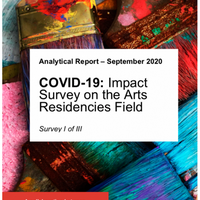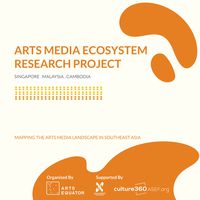European Foundation Centre study: Arts and Culture at the Core of Philanthropy

The European Foundation Centre (EFC) has launched ‘Arts and Culture at the Core of Philanthropy’, its first ever study gathering and analysing data on the topic at European level.
The study, initiated by the EFC’s Arts and Culture Thematic Network, is based on the responses of 40 philanthropic organisations from all over the EU that took part in a survey launched by the EFC last year. Co-Chair of the Network, Ignasi Miró, Director Cultural Area, “la Caixa” Banking Foundation says, “This mapping aims to shed light on what funders are doing in the field of arts and culture, and looks to identify foundations and other philanthropic organisations who fund, support, advocate and partner in initiatives to advance arts and culture in Europe.”
Some of the key highlights include.
- A significant percentage of the philanthropic budget in Europe is spent in the arts and culture sphere (an estimated €900 million, representing over 20% of total expenditure of participating organisations)
- The activities carried out by the organisations active in this field are diverse both in terms of themes (including Education, Integration and Research etc.) and approaches (grantmaking and programme development as well as non-financial means).
- Although the organisations are mainly working at a local level they seem to be very inclined to build partnerships and support collaborations at an international level. Additionally, several of the projects submitted are implemented at a local level but aim for wider global reach.
- There is a clear interest in multidisciplinary arts and cross-cutting areas and issues.
- According to the initiatives submitted by the organisations, there is a tendency to support projects and organisations in the long or medium run, often not less than three years, and in many cases for more than ten years.
- Respondents seem to be focusing more on the children and youth segment and less on the elderly. Nonetheless, most of the projects submitted are not targeting specific groups, but are rather aiming to reach all citizens and the general public and to bring people closer to arts and culture in different ways.
- Audience development and engagement is currently an important area of activity for the organisations that have replied to the survey: Over 60% of the respondents are active in this area.
- By nature, foundations can take risk and invest in areas that might be less supported by other actors, and through their long-term commitment they often aim to create models that can then be shared and replicated in other contexts or spheres. This is confirmed by the respondents of this survey.
- Some of the initiatives submitted already have been successfully scaled up and/or replicated in other countries or in other disciplines or contexts.
- There is an interest and dedication to building knowledge and evidence bases, and in evaluating programmes to use learning and data for implementing new projects, sharing learnings and advocating for the field.
In his foreword to the study Massimo Lapucci, EFC Chair and Secretary General of Fondazione CRT, one of the founding organisations of the Arts and Culture Thematic Network, welcomed the EFC report and says, “The need to care for culture, protect it, to pass it on to future generations, is where we see the model of institutional philanthropy really come to the fore. With our ability to think and work in the long term, we can help build the bridges between the generations to ensure that culture is both an asset to be enjoyed in the now and a legacy to be appreciated in the future… Culture matters. It always has, and it always will, in a civil society.”
Similar content
posted on
11 Sep 2016
posted on
08 May 2020
posted on
01 Dec 2020
posted on
13 Apr 2020
posted on
05 Oct 2020
05 Mar 2021






